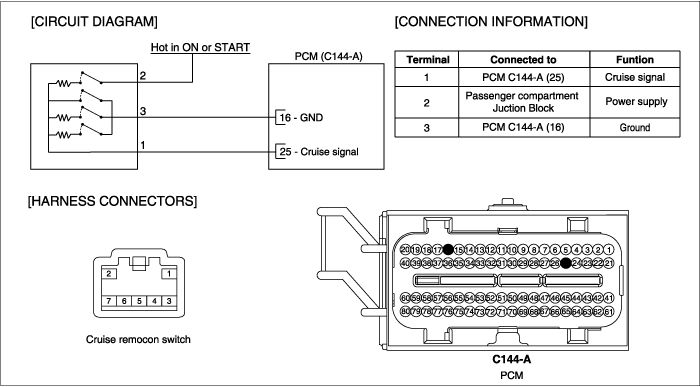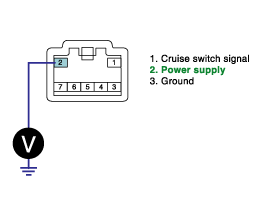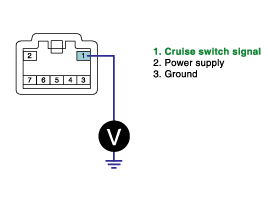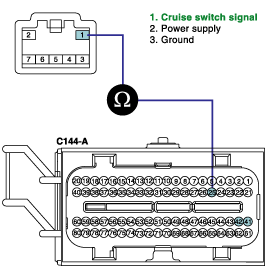Has a problem been found?

▶ Repair as necessary and go to "Verification of Vehicle Repair" procedure.

▶ Go to " Component Inspection " procedure.
The cruise control system makes the vehicle drive at a fixed speed until a signal canceling this fixed speed is received. When the main switch is turned on, the battery voltage is applied to the PCM. When a signal from the control switch like Set or Resume switch while driving is input to the PCM, it controls the ETS motor to make a car go at a steady speed you want. Also, while the system is operating, "CRUISE" indicator lamp on cluster lights up.
If the swich signal's voltage is not within the calibrated ranges when PCM checks the switch signal under detecting condition, PCM sets P0564.
Item | Detecting Condition | Possible cause |
DTC Strategy | ● Monitors the switch is switching too frequently or stuck for too long. | ● Poor connection ● Faulty cruise switch ● Faulty PCM |
Enable Conditions | ● Engine is running ● Ignition voltage ≥ 9V ● Cruise control system type is learned | |
Threshold value | ● Input switch signal is switching too frequently or stuck | |
Diagnosis Time | ● Switching: more than 1 second failure for 300 seconds test ● Stuck: more than 75 seconds failure for 300 seconds test | |
MIL On Condition | ● NO MIL ON(DTC only) |
Item | Resistance(Ω) |
ON/OFF switch | 3.9 kΩ ± 5% |
SET switch | 220 Ω ± 5% |
RESUME switch | 910 Ω ± 5% |
CANCEL switch | 0 Ω ± 5% |

Many malfunctions in the electrical system are caused by poor harness and terminals. Faults can also be caused by interference from other electrical systems, and mechanical or chemical damage.
Thoroughly check connectors for looseness, poor connection, bending, corrosion, contamination, deterioration, or damage.
Has a problem been found?

▶ Repair as necessary and go to "Verification of Vehicle Repair" procedure.

▶ Go to " Component Inspection " procedure.
IG "OFF" and disconnect Auto cruise switch connector.
IG "ON" and ENG "OFF"
Measure voltage between terminal 2 of auto cruise switch harness connector and chassis ground.
Specification : Approx. B+

Is the measured voltage within specification?

▶ Go to "Signal Circuit Inspection" procedure.

▶ Repair open or short to ground in harness, and go to "Verification of Vehicle Repair" procedure.
Check voltage
IG "OFF" and disconnect auto cruise switch connector.
IG "ON" and ENG "OFF"
Measure voltage between terminal 1 of auto cruise switch harness connector and chassis ground.
Specification : Approx. 5V

Is the measured voltage within specification?

▶ Go to "Component Inspection" procedure.

▶ Go to "Check short in harness" as follows.
Check short in harness
IG "OFF" and disconnect auto cruise switch connector and PCM connector.
Measure resistance between terminals 1 and 2 of auto cruise switch harness connector.
Measure resistance between terminals 1 and 3 of auto cruise switch harness connector.
Specification : Infinite

Is the measured resistance within specification?

▶ Go to "Check open in harness' as follows.

▶ Repair short in harness, and go to "Verification of Vehicle Repair" procedure.
Check open in harness
IG "OFF" and disconnect auto cruise switch connector and PCM connector.
Measure resistance between terminal 1 of auto cruise switch harness connector and terminal 25 of PCM harness connector.
Specification : Below 1Ω

Is the measured resistance within specification?

▶ Go to "Component Inspection" procedure.

▶ Repair open in harness, and go to "Verification of Vehicle Repair" procedure.
Check auto cruise switch
IG "OFF" and disconnect auto cruise switch connector.
Measure resistance between terminals 1 and 2 of auto cruise switch connector with each switch depressed.(Component side)
Measure resistance between terminals 1 and 3 of auto cruise switch connector with each switch depressed.(Component side)
Item | Resistance(Ω) | |||||
ON/OFF switch | 3.9 kΩ ± 5% between terminals 1 and 2 | |||||
SET switch | 220 Ω ± 5% between terminals 1 and 3 | |||||
RESUME switch | 910 Ω ± 5% between terminals 1 and 3 | |||||
CANCEL switch | 0 Ω ± 5% between terminals 1 and 3 | |||||

Is the measured resistance within specification?

▶ Substitute with a known - good PCM and check for proper operation.
If the problem is corrected, replace PCM and go to "Verification of Vehicle Repair" procedure.

▶ Substitute with a known - good auto cruise switch and check for proper operation.
If the problem is corrected, replace auto cruise switch and go to "Verification of Vehicle Repair" procedure.
There is a memory reset function on scantool that can erase optional parts automatically detected and memorized by PCM. After testing PCM on the vehicle, use this function to reuse the PCM on the others.
After a repair, it is essential to verify that the fault has been corrected.
Monitor and record the Freeze Frame Data for the Diagnostic Trouble Code(DTC) which has been diagnosed.
Using a Scantool, Clear the DTCs
Operate the vehicle within conditions noted in the freeze frame data or enable conditions
Monitor that all rediness test have been verified as " Complete "
Are any DTCs present ?

▶ Go to the applicable troubleshoooting procedure.

▶ System is performing to specification at this time.